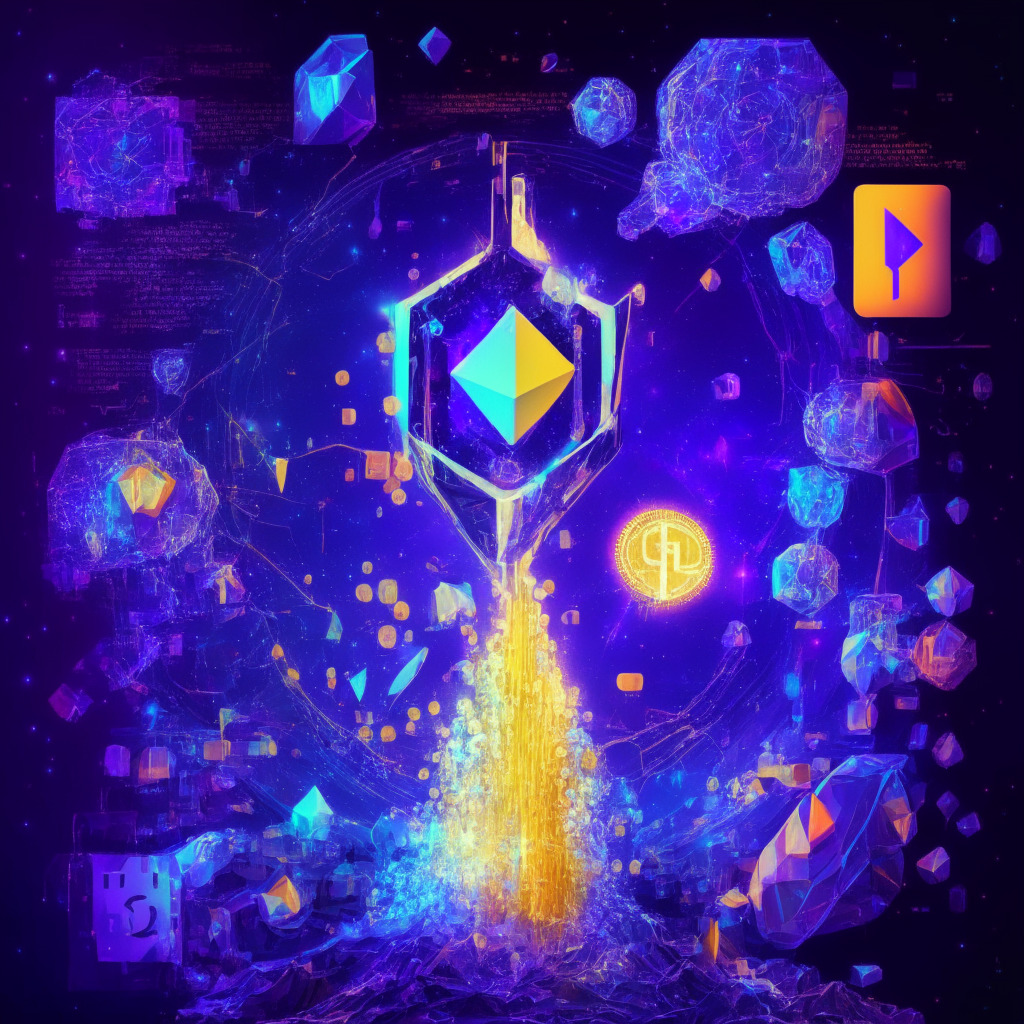ChatGPT, an AI chatbot developed by OpenAI, offers versatile applications in customer service and content generation, but raises concerns regarding safety, security, and biases. Balancing its revolutionary potential with associated risks is essential in shaping AI’s future impact on society.
Search Results for: OpenAI
DALL-E Unleashed: Revolutionary AI Image Synthesis and its Limitations
OpenAI’s DALL-E is a revolutionary generative AI model capable of producing unique visuals from textual descriptions, combining language and image processing concepts. Applications include creative design, marketing, and virtual worlds. However, limitations like biases and lack of contextual awareness require ongoing research to enhance the technology.
AI-Driven Scams in Crypto: Social Media Deception and Deepfake Dangers on the Rise
As AI advances, concerns grow about scammers exploiting this technology for fraud and deception, such as using AI-powered tools on social media platforms and AI-driven chatbots for promoting fake tokens and ICOs. This challenges the concept of social proof-of-work and puts vulnerable individuals within the crypto sphere at risk.
US House Adopts ChatGPT Plus: Privacy Concerns, Data Control, and AI Regulation Debate
The US House of Representatives recently adopted regulations allowing members to use only OpenAI’s ChatGPT Plus service due to privacy concerns. It remains unclear what specific privacy features this version offers. These rules signal growing awareness in AI’s potential risks and benefits to data security and privacy.
AI in Congress: Striking Balance Between Privacy & Innovation in Legislative Process
The U.S. House of Representatives has limited the use of OpenAI’s ChatGPT to ensure privacy preservation, authorizing only the ChatGPT Plus version under specific conditions. As AI technology advances, striking a balance between AI-driven innovations and privacy protection becomes crucial. Establishing a regulatory framework for AI applications is necessary to support its transformative potential without compromising privacy.
AI and Crypto Synergy: Unlocking Transparency, Decentralization, and User Control
The integration of AI and crypto has the potential to revolutionize both industries, fostering greater transparency, user control, and decentralization. Industry insiders suggest that AI could open up new opportunities for the blockchain sector, driving its resurgence and bringing additional real-world use cases.
AI-Guided Meditation Coaches: Revolutionizing Wellness or Replacing Human Jobs?
Ogimi, the first AI-guided meditation coach using OpenAI’s ChatGPT technology, offers personalized real-time meditation experiences tailored to users’ needs. The platform aims to provide one-on-one coaching, addressing concerns of AI replacing human coaches and potential misuse with guide rails and content monitoring. Balancing AI benefits and risks remains essential for a harmonious future.
Massive ChatGPT Credential Theft: Raccoon Malware, Crypto Risks & Cybersecurity Measures
Over 100,000 login credentials for OpenAI’s ChatGPT were found on the dark web, stolen by the Raccoon Infostealer malware via phishing emails. Cybersecurity firm Group-IB warns of the simplicity and effectiveness of such info stealers, while emphasizing the importance of employing security measures and staying informed about potential threats.
SoftBank CEO’s Emotional AI Connection: Examining ChatGPT’s Impact on Decision-Making & the Future
SoftBank CEO Masayoshi Son shares his emotional connection to ChatGPT, an AI chatbot developed by OpenAI. He envisions a future where technology can mitigate societal ills, such as natural disasters. However, skepticism remains regarding potential risks and downsides of AI dependence, including job displacement and the power dynamics between humans and AI.
The Impact of NLP and AI on Human-Machine Interaction: Opportunities and Challenges Ahead
The rapid advancements in natural language processing (NLP) and artificial intelligence (AI) have transformed interactions between humans and machines, driving applications in customer service, language translation, and content generation. Despite challenges in data acquisition, professional expertise, and workflow integration, AI continues to permeate various industries, reshaping the digital landscape.
Navigating AI’s Role in Japanese Classrooms: Benefits, Risks, and Data Privacy Concerns
The Japanese Ministry of Education plans to permit limited use of generative AI tools in classrooms, including chatbots like ChatGPT, to facilitate discussions and artistic activities. However, concerns about data privacy, cheating, and copyright infringement require proper attention and regulation. Allowing limited AI usage can serve as a starting point for evaluating its impact on education and policy development.
Binance Labs & CoinFund Fuel Neutron’s Growth: Interchain Security vs AI Funding Dominance
Binance Labs and CoinFund co-led a $10 million funding round for Neutron, a cross-chain smart contract platform in the Cosmos ecosystem. The investment aims to develop Neutron’s blockchain software, allowing developers to create secure, user-friendly decentralized applications (DApps) across 51 blockchains.
AI Regulation Race: Balancing Innovation with Ethics as Global Powers Act on Legislation
The proposed H.R.4223 bill aims to create a federal commission on AI to develop a comprehensive regulatory strategy for AI technologies. The bipartisan bill follows the introduction of strong UK AI laws and will address potential risks, while ensuring that US technological innovation remains intact.
Polygon Copilot: Revolutionizing Web3 with AI-Powered Assistance and User Experience
Polygon Copilot, an AI assistant developed in partnership with LayerE, integrates OpenAI’s GPT-3.5 and GPT-4 to enhance user experience in the Ethereum-compatible blockchain ecosystem. Offering insights, analytics, and guidance, Polygon Copilot makes navigating decentralized applications more accessible and user-friendly, highlighting AI’s growing importance in the blockchain and cryptocurrency industries.
Navigating Blockchain Complexity: Polygon Copilot’s AI Promise & Privacy Concerns
Polygon Labs introduces no-code AI platform, Polygon Copilot, to simplify understanding of Polygon (MATIC) for blockchain enthusiasts. This AI-powered guide extracts insights from public documentation and Web3.0 content, catering to diverse user needs in NFTs, DApps, gaming, DeFi, and social networks. Despite potential drawbacks, Polygon Copilot aims to bring accessibility to the complex world of blockchain technology.
AI Safety Legislation: Balancing Innovation and Public Trust in the Era of Artificial Intelligence
US Senate Majority Leader Chuck Schumer plans to call for comprehensive legislation regarding AI safety measures, emphasizing bipartisan action from Congress. Addressing safe innovation, privacy, biases, and misinformation, Schumer aims to ensure responsible and secure AI development while maintaining public trust in the technology.
National AI Commission Act: Balancing Innovation and Consumer Safety in AI Development
The National AI Commission Act, introduced by U.S. lawmakers, aims to establish a regulatory framework for AI technology by bringing together experts, government officials, industry representatives, and labor stakeholders to provide effective AI regulation, addressing concerns and potential risks associated with AI development and use.
EU AI Act Compliance Crisis: How LLMs Fall Short and the Road to Improvement
A recent Stanford University study reveals a concerning lack of compliance with the EU AI Act among large language models, including GPT-4 and Google’s Bard. Researchers ranked ten major model providers on their adherence to the 12 requirements outlined in the AI Act, finding a pressing need for improvement even among high-scoring providers. The study highlights transparency and accountability as crucial aspects of responsible AI deployment.
Ava Labs Integrates AvaGPT to Enhance User Support: Innovation Meets AI Limitations
Ava Labs introduces AvaGPT, employing OpenAI’s ChatGPT technology to provide quick assistance to Avalanche users while ensuring complex queries are handled by their customer support. Through a partnership with Kapa AI, AvaGPT becomes an integral part of Ava Labs Core platform. However, Ava Labs acknowledges AI limitations and maintains transparency on the accuracy of chatbot information.
Biden’s AI Summit: Balancing Innovation, Regulation, and Blockchain Implications
President Joe Biden is set to meet with AI experts to discuss the future of artificial intelligence and the need for legislation and guidelines. This comes at a time when the U.S. government has yet to establish a comprehensive strategy for AI development and cryptocurrency regulation, while Europe, China, and the United Kingdom have already made progress in these areas. The meeting aims to address concerns on policy, regulation, and balancing innovation with safety and risk mitigation.
Balancing AI Regulation: Impact on Crypto and Innovation
US lawmakers introduced the National AI Commission Act, aiming to create a commission focused on the development and implementation of AI regulations. This development has caught the attention of AI-based crypto tokens, with potential implications for the crypto space as strong regulation could promote broader adoption while overregulation could stifle innovation.
Ethereum Explorer Etherscan Integrates AI: A Boost to Blockchain R&D or Risky Move?
Ethereum blockchain explorer Etherscan has integrated AI technology in its newly launched Code Reader beta version, aiming to simplify blockchain research and development. Etherscan’s AI-powered Code Reader allows users to understand smart contract integration with decentralized applications, though potential inaccuracies warrant cautious use and verification.
Exploring the Fusion of AI and Bitcoin Mining: Opportunities and Hurdles in High-Performance Computing
Iris Energy aims to integrate high-performance computing with bitcoin mining, in line with the growing interest in AI. The AI-driven data center space is predicted to grow to $76 billion by 2028, and companies like Iris Energy see potential in combining these technology domains despite the challenges they may face.
Harnessing AI’s Potential: The Debate Over Stricter Regulations and Consumer Safety
Consumer protection groups in the EU are urging regulators to investigate AI models behind popular chatbots like OpenAI’s ChatGPT due to potential risks and vulnerabilities. As AI regulations tighten globally, balancing AI benefits with consumer rights and safety is crucial for creating a comprehensive regulatory framework and fostering public trust.
Etherscan Integrates ChatGPT: AI’s Role in Blockchain Analysis and the Risk of Hallucination
Etherscan has integrated ChatGPT into its platform, introducing the Code Reader for better Ethereum blockchain analysis. While AI advancements improve data processing, users should exercise caution and verify information, as AI-generated false content or “hallucinations” remain a concern.
SEC vs Binance.US Showdown: Unearthing Past Statements and Facing New Legislation
The U.S. SEC’s intention to freeze Binance.US’s assets faced a setback as Judge Amy Berman Jackson advised bilateral negotiations. Meanwhile, HKMA urges banks to accept crypto exchanges as clients, and the European Parliament passes the EU Artificial Intelligence Act, impacting governance of AI technologies.
Etherscan’s AI-Powered Code Reader: Boon or Bane for Smart Contract Decoding?
Etherscan introduces an AI-powered Code Reader tool, developed by OpenAI, to assist users in decoding Ethereum smart contract source code. It enables better understanding but should be used cautiously, as overconfidence in AI-generated information may lead to decision-making errors.
Elon Musk Labels AI Chatbot a Scam: BOB Token Value Dips & the Debate on Crypto Safety
An AI chatbot linked to the Pepe the Frog-inspired BOB Token has been removed from Twitter after Elon Musk called it a “scam crypto account.” Musk’s earlier interaction with the chatbot caused a 4,744% surge in token value, which later dipped by over 40% following the account’s suspension. This move aligns with Musk’s commitment to eliminating spam and maintaining a cleaner Twitter ecosystem.
AI
Twitter suspended AI-bot account “Explain This Bob” after Elon Musk accused it of being a “scam crypto account.” Linked to Bob Token (BOB), the account’s suspension led to a 30% price decline. Despite disagreement over the suspension, caution is advised when investing in crypto projects, and it’s important to recognize the positive contributions of AI-powered tools and decentralized technologies.
Mastering ChatGPT Prompts: Importance, Techniques, and Ensuring AI Safety
In this article, the importance of writing effective ChatGPT prompts is discussed to optimize AI performance. Users must provide clear instructions, specify context, and manage potential biases. The article also emphasizes prioritizing safety, security, and accountability while interacting with AI-powered tools.
Generative AI Boom: Balancing Privacy Risks and Technological Progress in a Data-Driven World
The meteoric ascent of generative artificial intelligence has raised privacy and security concerns amid user-focused products like OpenAI’s ChatGPT. Governments and tech figures are sounding the alarm as AI threats to data privacy go beyond one model or developer.
AI’s Ethical Dilemma: Balancing Abundance and Catastrophe in the Pursuit of Progress
Elon Musk emphasizes the urgent need for AI regulations to prevent catastrophic outcomes for humanity. Tech leaders call for responsible AI development prioritizing safety and accountability, while acknowledging AI’s potential for positive changes. The debate reflects broader concerns about ethics, safety, and accountability in technology.































